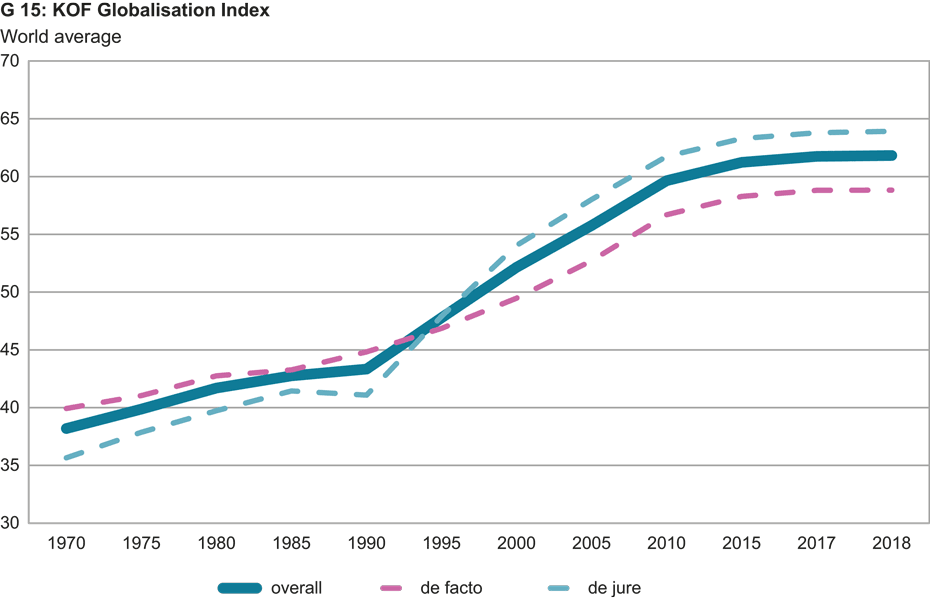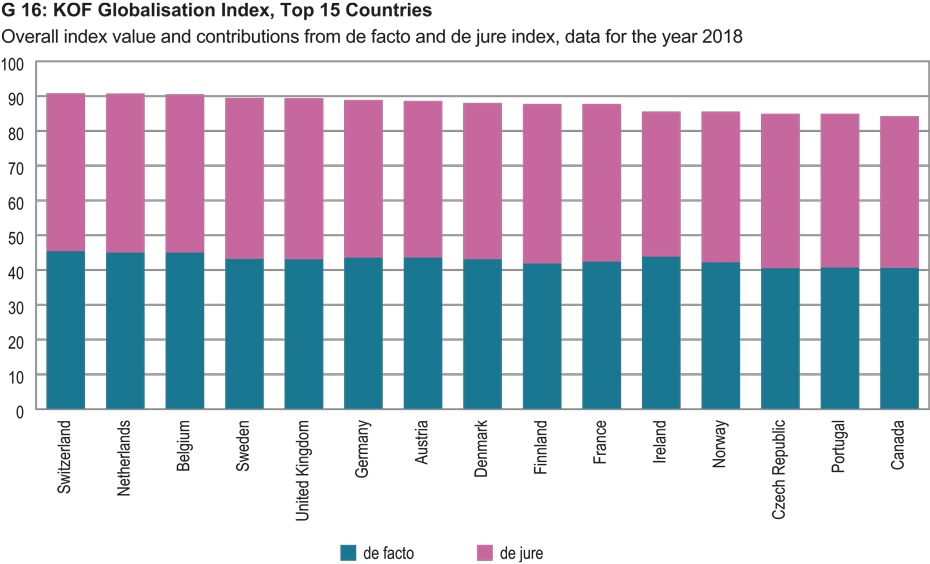Switzerland remains the most globalised country in the world
- World Economy
- KOF Index of Globalization
- KOF Bulletin
- Press release
Globalisation increased only slightly in 2018. Although economic globalisation has recently grown, the emerging international trade conflicts have revealed their first negative effects. The coronavirus crisis is likely to further slow economic and social globalisation as a result of the worldwide recession and restricted mobility. The most globalised countries are Switzerland, the Netherlands and Belgium.

Globalisation has been making only modest progress for some years now. This is shown by the KOF Globalisation Index, which surveys the economic, social and political dimensions of globalisation. In 2018 – the most recent year covered by the Index – the degree of globalisation worldwide rose only slightly (see G 15).
Economic globalisation has recently increased thanks to greater trade integration. World trade as a whole has grown significantly, and the effects of the trade dispute between the United States, China and the European Union, which flared up in 2018, have remained limited. However, the economic environment for trade globalisation (de jure trade globalisation in the form of tariffs, taxes and trade restrictions) in the Unites States has worsened, which suggests that the conflict is starting to have a negative impact on trade globalisation.
Financial globalisation has mostly remained flat. Social globalisation has also largely stagnated. In particular, the degree of interpersonal globalisation, i.e. the degree of cross-border personal contacts, has declined slightly. The extent of political globalisation has also decreased marginally year on year.

Switzerland highly globalised in all areas
Switzerland remained the most globalised country in the world in 2018, followed by the Netherlands and Belgium (see G 16). It is highly globalised in all categories covered (economic, social and political). Firstly, its economy has a high proportion of foreign trade and is strongly interconnected with other countries in the financial sector owing to its role as a banking centre and the headquarters of many international holding companies. Secondly, its geographical location, cultural diversity and high levels of income create a high degree of integration in the social sphere. And, finally, the many international organisations based in Switzerland have a positive impact on the country's political globalisation.

Coronavirus crisis will have consequences for globalisation
According to the KOF Globalisation Index, the worldwide degree of globalisation increased especially rapidly between 1990 and 2007. The financial crisis and the ensuing Great Recession slowed economic globalisation in particular. Whereas worldwide trade integration and financial globalisation have increased again in recent years, the worldwide recession this year is likely to be a setback for economic globalisation.
The amount of social globalisation has also been flatlining in recent years. The intensity of personal contacts (as measured by tourism flows or migration, for example) has fallen, while information flows (as measured by patent applications or high-tech trade, for example) and cultural globalisation have stagnated. This trend is likely to be reinforced by the current mobility restrictions imposed as part of the fight against the coronavirus pandemic.
Graphs and Tables can be found Download here (PDF, 237 KB).
The full ranking can be found Download here (XLSX, 71 KB).
Further information on the KOF Globalisation Index can be found here.
Contact
No database information available